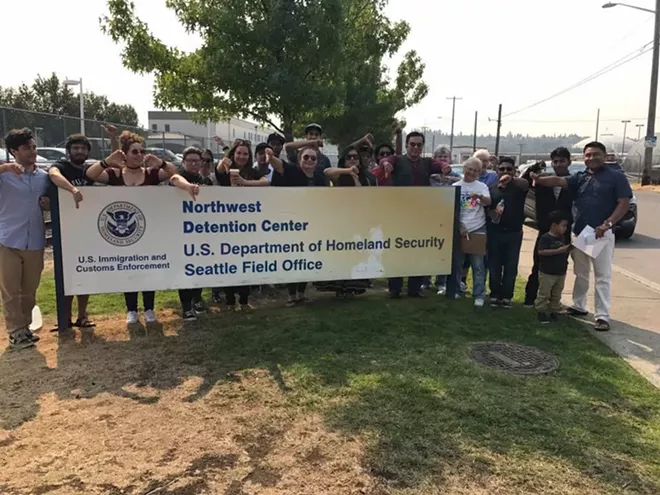Wednesday, September 20, 2017
Washington AG sues for-profit prison company that pays inmates in chips and candy

Courtesy of the NWDC Resistance
Protestors outside the Northwest Detention Center in Tacoma bring attention to dreadful conditions on the inside.
In exchange for cooking, doing laundry, cleaning bathrooms and working on the overall upkeep of Washington state's only privately owned prison, its inmates are paid about $1 per day. Or they're given a few extra snacks. Both are violations of the state's minimum wage law, according to a lawsuit filed today by the state Attorney General's Office against the company that operates the facility.
"A multi-billion dollar corporation is trying to get away with paying its workers $1 per day," AG Bob Ferguson says in a prepared statement. "That shouldn't happen in America, and I will not tolerate it happening in Washington. For-profit companies cannot exploit Washington workers."
Washington's lawsuit, filed in Pierce County, alleges that the GEO Group, Inc. is violating the state's minimum wage laws by paying Northwest Detention Center detainees a pittance for work that's required to maintain the facility.
NWDC, located in Tacoma, houses people awaiting civil immigration hearings or deportation. As of January 2017, Washington's minimum wage law requires that workers earn at least $11 an hour.
The law does not apply to "any resident, inmate or patient of a state, county or municipal correctional, detention, treatment or rehabilitative institution." But, Ferguson argues, "there are no exemptions for private, for-profit facilities like NWDC."
"The bottom line is that a fair wage should be paid for a day of work," says Joel Sacks, director of the state Department of Labor and Industries.
The GEO Group, which contracts with U.S. Immigration and Customs Enforcement to operate the facility, did not respond to specific questions. But in an emailed statement, the company says, "GEO strongly refutes the baseless and meritless allegations made in this lawsuit, and we intend to vigorously defend our company against these claims."
Wages for the company's "volunteer work program" are determined by the federal government, the GEO statement says.
But Maru Mora-Villalpando, a community organizer for the grassroots group NWDC Resistance, disputes GEO's description of a "volunteer" program.
Mora-Villalpando says that detainees are at times served food infested with maggots or pieces of fingernails. For those with little or no money to purchase food from the commissary, working for the facility is the only option for edible food, she explains.
Since at least 2014, detainees have gone on hunger strikes to raise awareness about the conditions inside the facility, including access to medical care, hygiene in the facility and quality of the food. At least 750 people stopped eating in the facility earlier this year.
"At any point we could have another hunger strike," Mora-Villalpando says. "People feel that's the only way for the public and authorities to know what's going on inside."
She credits the detainees who went on strike as the major influence for the Attorney General's lawsuit.
The suit asks that the GEO Group give up all profits made by underpaying detainees for years — an amount Ferguson estimates is in the millions.
The GEO Group projected $57 million in revenue for every year the 1,575-bed facility is at full capacity, a news release from the Attorney General's Office says.
The Florida-based company has contracted with ICE since 2005, the AG's office says. In 2015, ICE extended the contract to 2025.
The GEO Group operates 140 other detention facilities. Its revenues for 2016 surpassed $2 billion, the AG's news release says.
"We want the entire facility shut down," Mora-Villalpando says. "ICE has described this as their model facility. We wonder; if that's true, then what are other places like? The standard is way too low."
Tags: Northwest Detention Center , ICE , Bob Ferguson , Washington State Attorney General , lawsuit , minimum wage , GEO Group , News , Image














